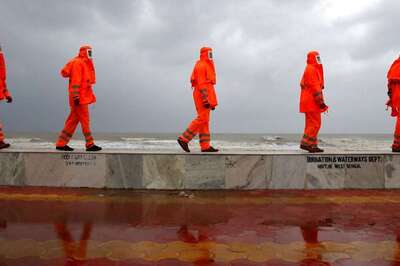
views
New Delhi: Lois Sofia, a Tamil Nadu student and writer, was arrested at the Tuticorin airport on Monday for calling the central government ‘fascist’ on a flight in front of state Bharatiya Janata Party (BJP) president Tamilisai Soundararajan.
On Tuesday, she was granted bail by the Thoothukudi court amid uproar over her arrest. Many took to social media and questioned if someone can be arrested for such sloganeering at the airport. However, the sections under which Sofia was arrested have been used earlier as well.
The Sections Slapped on Sofia:
Sofia was booked under Sections 290 (Punishment for public nuisance in cases not otherwise provided for), 505 (Statements Conducing to Public Mischief) of the Indian Penal Code in addition to Section 75(1) of the Tamil Nadu City Police Act, 1888.
What is Section 290 of the IPC?
This section essentially deals with punishment for public nuisance. Section 290 states that whoever commits a public nuisance in any case not otherwise punishable by the IPC, shall be punished with fine, which may extend to Rs 200.
One of the key points in this section is that it has no provision for granting imprisonment. All such cases of public nuisance for which no separate provisions for punishment have been made under the Code are covered under this section. The punishment of fine extending up to Rs 200 has, however, does not have much relevance now, but is enough to keep an accused busy in legal tangles.
Is Sofia a New Case Under the Section?
The primary targets of this section are beggars, transgenders, etc, who are harassed, arrested and detained under laws regulating public nuisance and obscenity. Section 290 and 294 of the IPC, for instance, effectively allow arrest for causing “annoyance of others” or doing “any obscene act in any public place”, or one who “sings, recites or utters any obscene song, ballad or words”.
A recent case under this section was registered by the Tamil Nadu police, who, in an attempt to act tough against those flouting the ban imposed on taking bath in the Cauvery river, arrested eight people.
A case was registered against them under IPC Section 290 (committing public nuisance) and Section 71 XVIII of the TNCP Act.
What is Section 505 of the IPC?
The key elements of this section are that whoever makes, publishes or circulates any statement, rumour or report with either of the following three intents:
a. to cause, or, which is likely to cause any officer, soldier sailor or airman to mutiny or otherwise disregard or fail in his duties as such;
b. or to cause fear or alarm to the public thereby inducing any person to commit an offence against the State or public tranquillity;
c. to incite any class or community to commit any offence against any other class or community shall be punished with imprisonment or with fine, or with both.
Section 505, one of the stringent sections levelled on Sofia, was earlier used to suppress freedom of expression.
Recently, a Facebook post on the catastrophic Kerala floods had landed a 33-year-old man in jail. Ashraf M Salethur had written a post on Kerala floods stating, “Bhakt: Entry of women resulted in Kerala floods? Me: What created in Parashuram’s creation, Mangaluru? (sic)”
Ashraf was booked under Section 505 of the IPC among other sections. He has now alleged that when other members of his community were celebrating Bakr Eid, he was kept in jail only in his inner garments.
Even according to the Supreme Court’s verdict on Kedarnath vs. State, each one of the constituent elements of Section 505 has reference to, and a direct effect on the security of the State or public order.
What is Section 75(1) of the Tamil Nadu City Police Act, 1888?
This section was inserted in the Madras City Police Act after the 1975 amendment. The clause (c) of this section states that when a public servant, who is in charge of maintaining public peace, questions a person in the performance of his lawful duty, must be replied politely. Whoever causes or is likely to cause breach of public peace would attract offence under Section 75(1)(c) of the Tamil Nadu City Police Act, 1888.
This is precisely what the charge is against Sofia and what had irked the BJP leader. The other parts of the section are the penalty for drunkenness or riotous or indecent behaviour in public space.
This section, however, prescribes punishment along with fine.




















Comments
0 comment